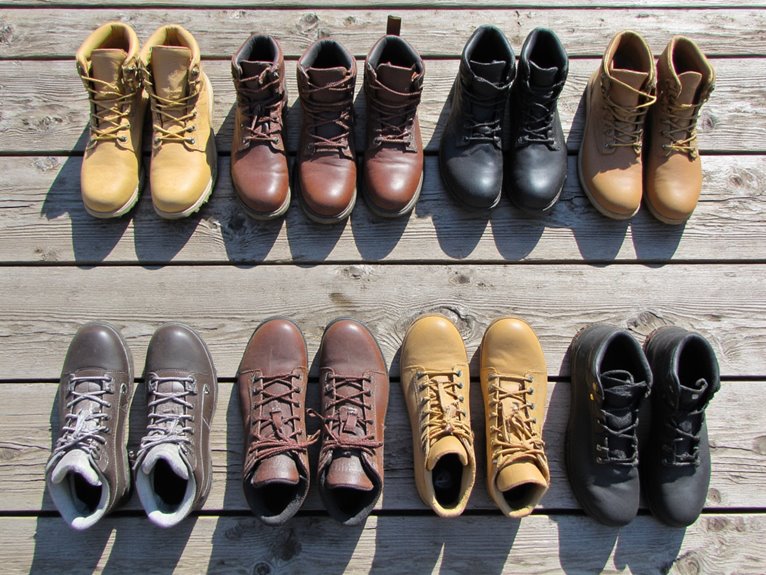What Cookware Should I Avoid?
In the realm of cookware, some materials and designs are better left on the shelf, as they can pose serious health risks, compromise the flavor and quality of your cooking, or simply drive you crazy with their maintenance demands. Non-stick coatings with PFOA and PFOS, aluminum, and copper are all toxic culprits to steer clear of. Cheap stainless steel, ceramic-coated, and hard anodized cookware can be more hassle than they're worth. And let's not forget the risks of using old or damaged cookware, which can harbor bacteria and leach toxic chemicals into your food. The kitchen is no place for these hazardous suspects – and there's more to uncover.
We are supported by our audience. When you purchase through links on our site, we may earn an affiliate commission, at no extra cost for you. Learn more. Last update on 3rd December 2025 / Images from Amazon Product Advertising API.
Non-Stick Coatings to Avoid
Avoiding the pitfalls of problematic non-stick coatings is essential, as some can leach toxic chemicals into your food, compromising both flavor and health.
You don't want to unwittingly serve up a side of toxins with your scrambled eggs.
Perfluorooctanoic acid (PFOA) and perfluorooctane sulfonate (PFOS) are two notorious offenders commonly found in non-stick cookware. These chemicals have been linked to cancer, reproductive issues, and thyroid problems.
When heated, they can break down and release harmful fumes.
Opt for PFOA- and PFOS-free non-stick coatings or consider alternative cookware materials like stainless steel, cast iron, or ceramic.
Your taste buds and body will thank you.
Aluminum and Copper Risks
In the realm of aluminum and copper cookware, the risks are multifaceted.
Not only do these metals have the potential to leach toxic substances into your food, but they also come with significant heat conduction drawbacks and a pesky tendency to react with acidic ingredients.
Let's take a closer look at the specific pitfalls of cooking with aluminum and copper, and why you may want to reconsider your cookware choices.
Toxic Metal Leaching
What's lurking in your cookware could be slowly poisoning you, as certain metals like aluminum and copper have been shown to leach toxins into your food.
These metals can react with acidic or salty foods, releasing harmful compounds into your meals.
Aluminum, in particular, has been linked to Alzheimer's disease and other health issues.
Copper, on the other hand, can cause nausea, vomiting, and even liver damage.
The risk is higher when cooking with high-acidity foods like tomatoes or citrus.
To minimize the risk, avoid cooking with aluminum or copper cookware, especially when preparing acidic dishes.
Instead, opt for safer, non-reactive materials like stainless steel or cast iron.
Heat Conduction Drawbacks
One major drawback of aluminum and copper cookware is their tendency to conduct heat unevenly, leaving you with a culinary crapshoot: will your dish be perfectly cooked, or will it be burnt to a crisp in some spots and raw in others?
This erratic heat distribution can lead to a frustrating cooking experience, as you'll constantly need to adjust heat levels and cooking times.
Additionally, copper cookware can be particularly finicky, as its high thermal conductivity means it can quickly go from simmer to scorch.
If you value consistency in your cooking, it's best to steer clear of these heat-conducting culprits and opt for cookware that provides a predictable performance.
Reacts With Acidic Foods
Two metals notorious for their reactivity with acidic foods are aluminum and copper, which can leach into your meal, imparting unwanted flavors and even posing health risks.
When cooking with acidic ingredients like tomatoes, citrus, or vinegar, these metals can react, releasing toxins into your food.
This is especially concerning with aluminum, as it has been linked to Alzheimer's disease and other health issues.
Copper, on the other hand, can impart a metallic taste and cause digestive problems.
To avoid these risks, it's best to opt for cookware made from non-reactive materials like stainless steel, ceramic, or cast iron.
Your taste buds and health will thank you!
Cheap Stainless Steel Options
When it comes to cheap stainless steel options, beware of thin, flimsy constructions that can warp or scratch easily, ultimately rendering them useless for cooking.
These subpar pots and pans may be tempting due to their affordable price tags, but trust us, you get what you pay for.
A stainless steel cookware set that's excessively lightweight or has a rough, porous finish is a recipe for disaster.
Not only will they fail to distribute heat evenly, but they'll also be a pain to clean and maintain.
Save yourself the headache and invest in a reputable brand that offers durable, high-quality stainless steel cookware.
Your cooking skills (and your kitchen) will thank you.
Ceramic-Coated Cookware Concerns
In the realm of ceramic-coated cookware, the glossy exterior can be deceiving.
Beneath the surface, a trifecta of troubles lurks, threatening to ruin your cooking experience.
From the risk of chipping and flaking, to the leaching of toxic chemicals, and the inevitable non-stick failure, it's time to expose the concerns surrounding these seemingly innocuous pots and pans.
Chipping and Flaking Risk
Ceramic-coated cookware's Achilles' heel is its propensity for chipping and flaking, a phenomenon that can render your once-non-stick pan a sticky, scratched mess.
This occurs when the ceramic coating wears off, exposing the underlying metal.
The consequences? Food residue clings to the pan, making cooking and cleaning a nightmare.
In addition, the exposed metal can react with acidic foods, altering their taste and nutritional value.
To minimize the risk of chipping and flaking, avoid using metal utensils, abrasive cleaners, and stacking ceramic-coated cookware.
Furthermore, handle your cookware with care, and it might just survive the kitchen chaos.
Toxic Chemical Leaching
Beyond the chipping and flaking risks, another concern lurks in the shadows of ceramic-coated cookware: the potential for toxic chemical leaching.
This is a major red flag, as the ceramic coating can contain harmful chemicals like lead, cadmium, and PFOA.
When these chemicals leach into your food, they can cause serious health issues. It's like inviting a toxic guest to dinner – not exactly the recipe for a healthy meal.
To minimize the risk, avoid using ceramic-coated cookware at high heat, and never put it in the dishwasher. Also, be cautious when cooking acidic foods, as they can accelerate the leaching process.
Stay vigilant, and remember: a healthy meal starts with healthy cookware.
Non-Stick Failure Rate
The non-stick surface of ceramic-coated cookware has a expiration date, and it's shorter than you think, rendering your once-trusty skillet nearly useless within a few years.
The non-stick coating starts to deteriorate, and before you know it, your eggs are sticking like glue and your pancakes are a crumbly mess.
It's not just the cooking performance that suffers; the flaking non-stick particles can also contaminate your food.
Manufacturers often claim their ceramic coatings are durable, but in reality, they can start to degrade after just a few months of heavy use.
Be prepared to replace your ceramic-coated cookware frequently, or consider alternatives that won't leave you scrambling for a new skillet every year.
Avoiding Hard Anodized Cookware
Most home cooks would be better off skipping hard anodized cookware altogether, given its penchant for chipping, flaking, and generally being a pain to clean.
The anodizing process is supposed to create a durable, non-stick surface, but in reality, it's more like a ticking time bomb waiting to ruin your dinner party.
Even with gentle use, hard anodized cookware can degrade quickly, leaving you with a pot or pan that's more trouble than it's worth.
And good luck trying to scrub off last night's lasagna – it's like trying to remove superglue from your favorite kitchen utensils.
Trust us, there are far better options out there for home cooks who value ease, durability, and a stress-free cooking experience.
Old or Damaged Cookware Dangers
Using old or damaged cookware can be a recipe for disaster, as it can contaminate your food, ruin your meal, and even pose serious health risks.
Scratched, chipped, or corroded surfaces can harbor bacteria, while worn-out non-stick coatings can release toxic fumes when heated.
Additionally, old cookware may leach metals like lead or copper into your food, leading to long-term health problems.
In addition, don't risk it – retire that old frying pan or pot and invest in new, safe cookware.
Remember, a few bucks saved now can cost you dearly in the long run.
Your health and taste buds will thank you for making the switch!




